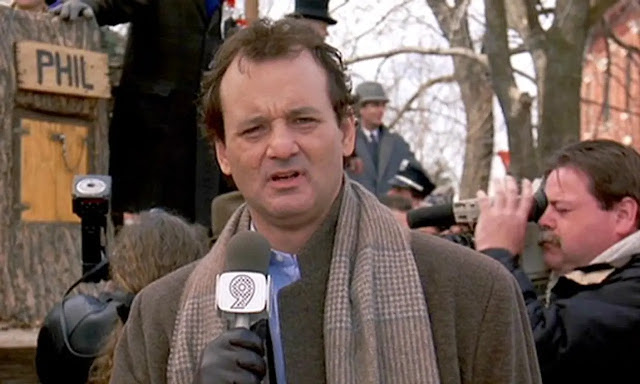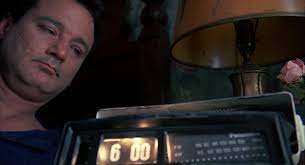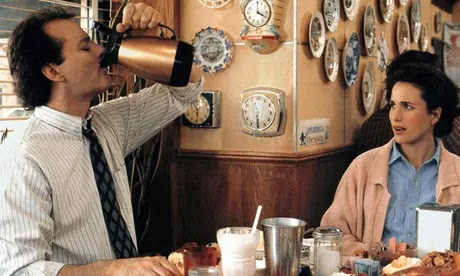Groundhog Day is an all-time great comedy film headlined by a career best Bill Murray performance...oh and it just so happens to feature a surprisingly moving, insightful, and Christian perspective on the meaning of life. Now, I'm not saying this is some stealth Christian film, just that many of its major themes, intentional or not, find substantial agreement with the historic Christian faith I hold to. Think about it: the film identifies the sad nature and scope of our human brokenness and explores how grace and selfless love are his only exit from an existential death spiral. Heavy stuff of a religious nature for a comedy right?
Thankfully, this time-looping existential comedy miraculously finds its equilibrium in Murray's "can you believe this is happening to me?" performance. This film proves a perfect vehicle for Murray's unique ability to bounce between being a sarcastic, condescending narcissist and a playful, witty, and charismatic scene-stealer - all while still being funny and likeable! Murray plays Phil Connors, a self-centered and mean-spirited weatherman for a television station in Pittsburgh. Along with his producer Rita (Andie MacDowell), and cameraman Larry (Chris Elliot), Phil must head down to the small town of Punxsutawney, Pennsylvania to do a remote broadcast for Groundhog Day. Phil hates the assignment, hates the town, and makes it known to his colleagues that the entire enterprise is beneath him. He slogs his way through his duties and tries to escape Punxsutawney, but is forced to return due a bad blizzard. When he wakes up the next morning, Phil is presented with Groundhog Day...again. Something mystical has happened and Phil is forced to relive the day over and over in a never-ending loop. How will Phil handle it? Will he ever be able to escape the seemingly infinite cycle?
Groundhog Day may not be the first movie to feature a "time loop" gimmick, but it's easily my favorite use of it. The loop gimmick provides the story (really a fairy tale like character study) a perfect structure to identify and address Phil's character issues step by step. Phil begins the film a self-centered jerk - someone unable to truly love others because he can't ever see past his own needs and desires. Groundhog Day, the holiday, is when the groundhog, also named Phil (I didn't say the film was subtle guys), comes out and if he sees his shadow it’s a longer winter. See the connection? The film has used the groundhog day tradition as a metaphor for Phil's brokenness; as long as Phil Connors continues to see his own shadow (not see past his own needs and desires) he will continue in this repetitive hell (that's an insight of its own right there!). The promise here is that once he's able to get past his own shadow, a spring (or-rebirth) will take place. Will Phil ever recognize this problem and how will he be able to get past his own shadow?
So how can Phil get out of his own self-reinforcing shadow? The film eventually tips its hand with the character of Rita (she always delivers the clarifying lines to Phil - she's called an "angel" by Phil afterall) while Phil’s eating away at the diner, "The wretch, concentred all in self, living, shall forfeit fair renown, and doubly dying, shall go down, to the vile dust from whence he sprung - unwept, unhonored, and unsung. Sir Walter Scott." It's after this comment that Phil chooses to open up and share his secret, his suffering, with Rita and she graciously and mercifully listens to him. The key here is that Phil isn't sharing his secret to manipulate her, he's recognizing and confessing where his shadow-led life has brought him. Rita indulges him kindly and after spending an entire day together (not manipulated for perfection or with the end goal of sex in mind) the two are laying on the bed together trying to stay up until 6am and Phil whispers to Rita, "I think you're the kindest, sweetest, prettiest person I've ever met in my life. I've never seen anyone that's nicer to people than you are. The first time I saw you... something happened to me. I never told you but... I knew that I wanted to hold you as hard as I could. I don't deserve someone like you. But if I ever could, I swear I would love you for the rest of my life. Rita."
Groundhog Day may not be the first movie to feature a "time loop" gimmick, but it's easily my favorite use of it. The loop gimmick provides the story (really a fairy tale like character study) a perfect structure to identify and address Phil's character issues step by step. Phil begins the film a self-centered jerk - someone unable to truly love others because he can't ever see past his own needs and desires. Groundhog Day, the holiday, is when the groundhog, also named Phil (I didn't say the film was subtle guys), comes out and if he sees his shadow it’s a longer winter. See the connection? The film has used the groundhog day tradition as a metaphor for Phil's brokenness; as long as Phil Connors continues to see his own shadow (not see past his own needs and desires) he will continue in this repetitive hell (that's an insight of its own right there!). The promise here is that once he's able to get past his own shadow, a spring (or-rebirth) will take place. Will Phil ever recognize this problem and how will he be able to get past his own shadow?
The choice to wake up Phil each morning at 6am with the turn of the clock and a radio message is inspired. Is there a better symbol for the tyranny of "time" over contemporary man than the alarm clock? That iconic radio message each morning sets up the key daily question, “Will Phil come out and see his shadow?” Yeah, it literally says that (again I didn't say it was subtle!). This is classic fairy tale storytelling and I love it. The first major section of the time loop is Phil's initial confusion and horror of going through the same conversations and moments as the original day. When he tries to explain to Rita, to doctors, and to psychiatrists, no one (of course) can really understand his situation.
Once the shock and confusion wears off, Phil realizes that the no consequences nature of the time loop allows him to indulge almost every selfish impulse he has. We get several sequences with Phil randomly sleeping with women, eating like a glutton, driving recklessly, mocking policeman, stealing money, punching out people he doesn’t like, buying fancy cars, dressing up as Clint Eastwood and taking prostitutes out to the theater. Most of this is presented in a light-hearted fantasy like manner, but it takes a darker turn when Phil begins using the time loop concept to manipulate women into bed. The film eschews getting graphic here thankfully, but the viewer realizes just how insidious Phil could be with this concept if he wanted. The shadow of selfishness looms large and is hard to escape. As long as Phil is in his own shadow he interprets everything by how it can fulfill his desires. He is simply unable to enjoy all the goodness that is in front of him: the beauty of the small town, the joy of the community, the lovely bed and breakfast hostess, the niceness of the colleagues he works with (Rita and the cameraman Larry), and so many other things he'll realize later.
When the value of Phil's pleasure binges dry up, Phil turns his eyes to his producer Rita, played charmingly by Andie McDowell, and he begins to use his time loop advantages to try and woo her with the perfect date. I enjoy the laughs they are able to wring from Phil repeatedly using the time loop concept to trying the date over and over, making small adjustments, taming his sarcasm, turning on the charm, and discovering Rita's preferences. The catch to it all, and its one of the genius features of the film, is that while Phil is being very clever here and seemingly unselfish to work so hard, we all know deep down that it's creepy and manipulative; she's an object for Phil's fulfillment, it isn't true love. Phil’s shadow continues to loom large even in these actions – it’s all still part of his empty pleasure binge.
When Phil ultimately strikes out with Rita an interesting exchange takes place. Rita says, "I could never love someone like you. You only love yourself." Phil's response is, "That's not true. I don't even like myself." Oof. Murray's delivery always gets a laugh from me, but it’s a deep and cutting insight: one of the reasons the shadow of our selfishness looms so large and is so prison-like is often due to our inability to love ourselves. There’s a revealing comment Phil shares with Rita that underscores this, “I’ve killed myself so many times, I don’t even exist anymore.” Somehow that line resonates with me as an older man now than when I watched it as a teenager. There is an element of self-loathing over our failures and our regrets, a loathing of our selfishness that turns the shadow into a self-reinforcing spiral. That's exactly what happens next, a bitter and rejected Phil now wakes each morning with existential dread. We get a series of sequences where Phil tries to end his life – the first attempt being his stealing of the groundhog and driving Thelma and Louise style over a cliff. The scenes are largely played for laughs, but like most of the movie, there's a heartbreaking underlining here. If Phil is unable to love himself and truly love others, what meaning is there in life at all?
So how can Phil get out of his own self-reinforcing shadow? The film eventually tips its hand with the character of Rita (she always delivers the clarifying lines to Phil - she's called an "angel" by Phil afterall) while Phil’s eating away at the diner, "The wretch, concentred all in self, living, shall forfeit fair renown, and doubly dying, shall go down, to the vile dust from whence he sprung - unwept, unhonored, and unsung. Sir Walter Scott." It's after this comment that Phil chooses to open up and share his secret, his suffering, with Rita and she graciously and mercifully listens to him. The key here is that Phil isn't sharing his secret to manipulate her, he's recognizing and confessing where his shadow-led life has brought him. Rita indulges him kindly and after spending an entire day together (not manipulated for perfection or with the end goal of sex in mind) the two are laying on the bed together trying to stay up until 6am and Phil whispers to Rita, "I think you're the kindest, sweetest, prettiest person I've ever met in my life. I've never seen anyone that's nicer to people than you are. The first time I saw you... something happened to me. I never told you but... I knew that I wanted to hold you as hard as I could. I don't deserve someone like you. But if I ever could, I swear I would love you for the rest of my life. Rita."
In terms of story, it's Phil's honest and humble confession met by Rita's grace and kindness that breaks the cycle. From here out, Phil’s life is revitalized, and he sets about making himself a better person. He’s grabbing coffee for his workmates, indulging strangers in conversation, learning languages, becoming a musician, quoting poetry, and making ice sculptures. There’s a beautiful turning point when Phil spots an old homeless man shivering in the dark whom he used to walk by everyday and not think twice about. He brings the man to the hospital but he passes away shortly after. Phil’s realization that the man has been dying under his nose every single day is heartbreaking and marks a giant shift in Phil’s ability to recognize not just his own suffering, but the suffering in others. In this phase, Phil becomes a kind of protector of Punxsutawney, catching kids falling out of a tree, fixing flat tires, performing the Heimlich on choking patrons, and performing on the piano for a dancing crowd. The more Phil exits the shadow of his own existence, the more he can find the meaning in serving and loving others. There’s an interesting sequence where at the end of a party they host a bachelor’s auction and Phil is thrust up there with the town’s women all voting on him and Rita pretty much giving up everything she had in her pocket for Phil. As Phil has begun to love others without expectation of return, he has become immensely lovable. He spends the night with Rita, simply content to be and to be in love and give love. He wakes up the next day with the "curse broken" - he has no longer seen his shadow and the new life of spring is on the arrival.
This is my favorite realization of the film: Phil's shadow was not broken by his own efforts. He did not will himself out of it - that seemed impossible to do. It began with honest and broken confession that was met simply with grace and kindness. Rita's love broke through like light into his darkness. It was Rita's grace that encouraged him to become someone more deserving of love and more giving of love. In other words, one cannot will themselves out of their selfishness, but an act and attitude of grace and kindness from another to our undeserving selves can break the cycle. If you can't see Christian parallels here, then let me not be subtle and point them out a bit - Rita is clearly a Christ-like figure here. I'm not saying the writers intended Christian parallels, in fact the universe of the film seems quite intentionally Godless and therefore more of a humanistic take, but that doesn't mean they can't stumble upon truths that Christianity have proclaimed for a long time, right? How can we overcome our innate and self-reinforcing selfishness? The Christian scriptures call us to love others because God has first loved us! When we humbly confess our brokenness and recognize it was God who took the initial step of grace and love to approach us in our selfishness through his son Christ, and we experience the Spirit of God there is a powerful re-birth. We all seem stuck in the monotony of daily life and wake up faced with the question, "Will you see your shadow?" or will you choose to live outside of it? This film is a great reminder that there is an empty and repetitive hell to those who stay within the shadow and a glorious new life to those who challenge it.
This is my favorite realization of the film: Phil's shadow was not broken by his own efforts. He did not will himself out of it - that seemed impossible to do. It began with honest and broken confession that was met simply with grace and kindness. Rita's love broke through like light into his darkness. It was Rita's grace that encouraged him to become someone more deserving of love and more giving of love. In other words, one cannot will themselves out of their selfishness, but an act and attitude of grace and kindness from another to our undeserving selves can break the cycle. If you can't see Christian parallels here, then let me not be subtle and point them out a bit - Rita is clearly a Christ-like figure here. I'm not saying the writers intended Christian parallels, in fact the universe of the film seems quite intentionally Godless and therefore more of a humanistic take, but that doesn't mean they can't stumble upon truths that Christianity have proclaimed for a long time, right? How can we overcome our innate and self-reinforcing selfishness? The Christian scriptures call us to love others because God has first loved us! When we humbly confess our brokenness and recognize it was God who took the initial step of grace and love to approach us in our selfishness through his son Christ, and we experience the Spirit of God there is a powerful re-birth. We all seem stuck in the monotony of daily life and wake up faced with the question, "Will you see your shadow?" or will you choose to live outside of it? This film is a great reminder that there is an empty and repetitive hell to those who stay within the shadow and a glorious new life to those who challenge it.





Comments
Post a Comment